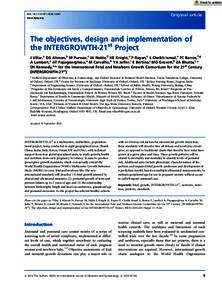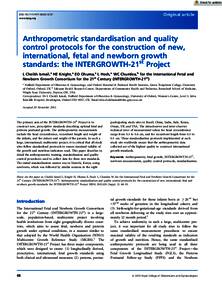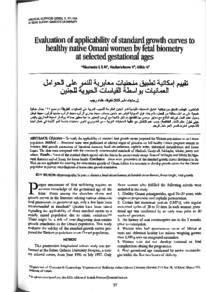Document
The Objectives, design and implementation of the intergrowth-21 <sup>st</sup> Project.
Identifier
DOI: 10.1111/1471-0528.12047
Contributors
Altman, D. G., Author
Purwar, M., Author
Noble, J. A., Author
Knight, H. E., Author
Ruyan, P., Author
Ismail, L. Cheikh., Author
Barros, F. C., Author
Lambert, A., Author
Papageorghiou, A. T., Author
Carvalho, M., Author
Jaffer, Y. A., Author
Bertino, E., Author
Gravett, M. G., Author
Bhutta, Z. A., Author
Kennedy, S. H., Author
Publisher
Elsevier.
Gregorian
2013-05
Language
English
English abstract
INTERGROWTH-21st is a multicentre, multiethnic, populationbased project, being conducted in eight geographical areas (Brazil, China, India, Italy, Kenya, Oman, UK and USA), with technical support from four global specialised units, to study growth, health and nutrition from early pregnancy to infancy. It aims to produce prescriptive growth standards, which conceptually extend the World Health Organization (WHO) Multicentre Growth Reference Study (MGRS) to cover fetal and newborn life. The new international standards will describe: (1) fetal growth assessed by clinical and ultrasound measures; (2) postnatal growth of term and preterm infants up to 2 years of age; and (3) the relationship between birthweight, length and head circumference, gestational age and perinatal outcomes. As the project has selected healthy cohorts with no obvious risk factors for intrauterine growth restriction, these standards will describe how all fetuses and newborns should grow, as opposed to traditional charts that describe how some have grown at a given place and time. These growth patterns will be related to morbidity and mortality to identify levels of perinatal risk. Additional aims include phenotypic characterisation of the preterm and impaired fetal growth syndromes and development of a prediction model, based on multiple ultrasound measurements, to estimate gestational age for use in pregnant women without access to early/frequent antenatal care.
Member of
ISSN
1470-0328
Resource URL
Category
Journal articles



